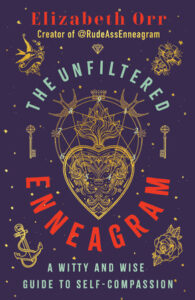Ennea-what? An introduction to Enneagram (and yourself)
A guest post by Associate University Chaplain for Spiritual Formation Liz Orr on behalf of WFU’s Professional Development Center. Orr is the author of “The Unfiltered Enneagram: A Witty and Wise Guide to Self-Compassion.”
 “The Ennea-what?” is the most common response I get from well-meaning strangers when, upon learning that I’ve written a book, they earnestly ask me what the book is about. While it’s enjoying some new-found fame on social media, the Enneagram is still somewhat modest in its fanbase, compared to similar frameworks like the Myers Briggs, Strengthsfinder, and even astrology. While the Enneagram is, in one sense, a personality typing system, in another, it’s so much more than that – but with formal training on the Enneagram being enormously expensive and time-consuming, most people are left to sift through the Wild West of the internet, whiplashed between dense, inaccessible content written by self-serious and self-appointed “experts,” and fluffy, entertaining but unstructured and ultimately unhelpful listicles about what Enneagram Type your favorite character from Gilmore Girls is.
“The Ennea-what?” is the most common response I get from well-meaning strangers when, upon learning that I’ve written a book, they earnestly ask me what the book is about. While it’s enjoying some new-found fame on social media, the Enneagram is still somewhat modest in its fanbase, compared to similar frameworks like the Myers Briggs, Strengthsfinder, and even astrology. While the Enneagram is, in one sense, a personality typing system, in another, it’s so much more than that – but with formal training on the Enneagram being enormously expensive and time-consuming, most people are left to sift through the Wild West of the internet, whiplashed between dense, inaccessible content written by self-serious and self-appointed “experts,” and fluffy, entertaining but unstructured and ultimately unhelpful listicles about what Enneagram Type your favorite character from Gilmore Girls is.
I realize I’m attempting to define the Enneagram more in terms of what it is not rather than what it is – it’s not just another personality typing system, and it’s not just cute canva created content to share on Instagram – but if I had to try to make an elevator pitch for the Enneagram in more affirmative terms, I would say that the Enneagram is a powerful framework to support our muscles for self-awareness, self-compassion, and compassion and understanding within our relationships. It doesn’t tell us who we are so much as it shows us how we get in our own way.
Consisting of nine distinctive “Types” that all hold nine distinctive, but equally valid beliefs and fears about the world, survival strategies, protective patterns, and emotional ruts, the Enneagram helps us to understand why we do what we do. It helps us to see more clearly that the seemingly unshakeable habits within ourselves and others that we are frustrated by are not random, nor petty, but instead are the best measures of self-protection that we believed we had available to us at the time. The Enneagram helps us recognize that our worst patterns – whether they are cycles of exhausting perfectionism, self-sacrificial people pleasing, or overperforming to the point of burnout – are often our best attempts to just get through a difficult situation. Realizing this can help us find compassion for ourselves as we start to untangle ourselves from defensive routines that no longer serve us.
But self-compassion isn’t the endpoint of the Enneagram path – it is only the beginning, and it leads us to greater compassion for others, too. Extending compassion to ourselves for the ways we drive ourselves up the wall invites us to extend the same compassion to others (our friends, our families, our colleagues) when they are driving us up the wall. It can be fun to share these cute little social media posts about our Type, but the real magic of the Enneagram is in its capacity to create a more compassionate world within our homes, our relationships, our workplaces, and most importantly, within ourselves.
The PDC partners with individuals and groups campus-wide in facilitating professional development courses for faculty and staff. Register for Orr’s “Introduction to the Enneagram,” class to be held this fall.
Continue your professional development with the PDC:
Visit us online at pdc.wfu.edu
Register for our classes through Workday Learning
Follow the PDC on Instagram @wfutalent
Or, contact our professional staff:
William (Bill) Gentry (gentrywa@wfu.edu)
Director of the PDC and Learning & Development
Missy Campbell (campbem@wfu.edu)
Manager, Learning & Development
Melissa Clodfelter (clodfem@wfu.edu)
Assistant Vice President, Faculty & Staff Experience
Categories: Wellbeing
